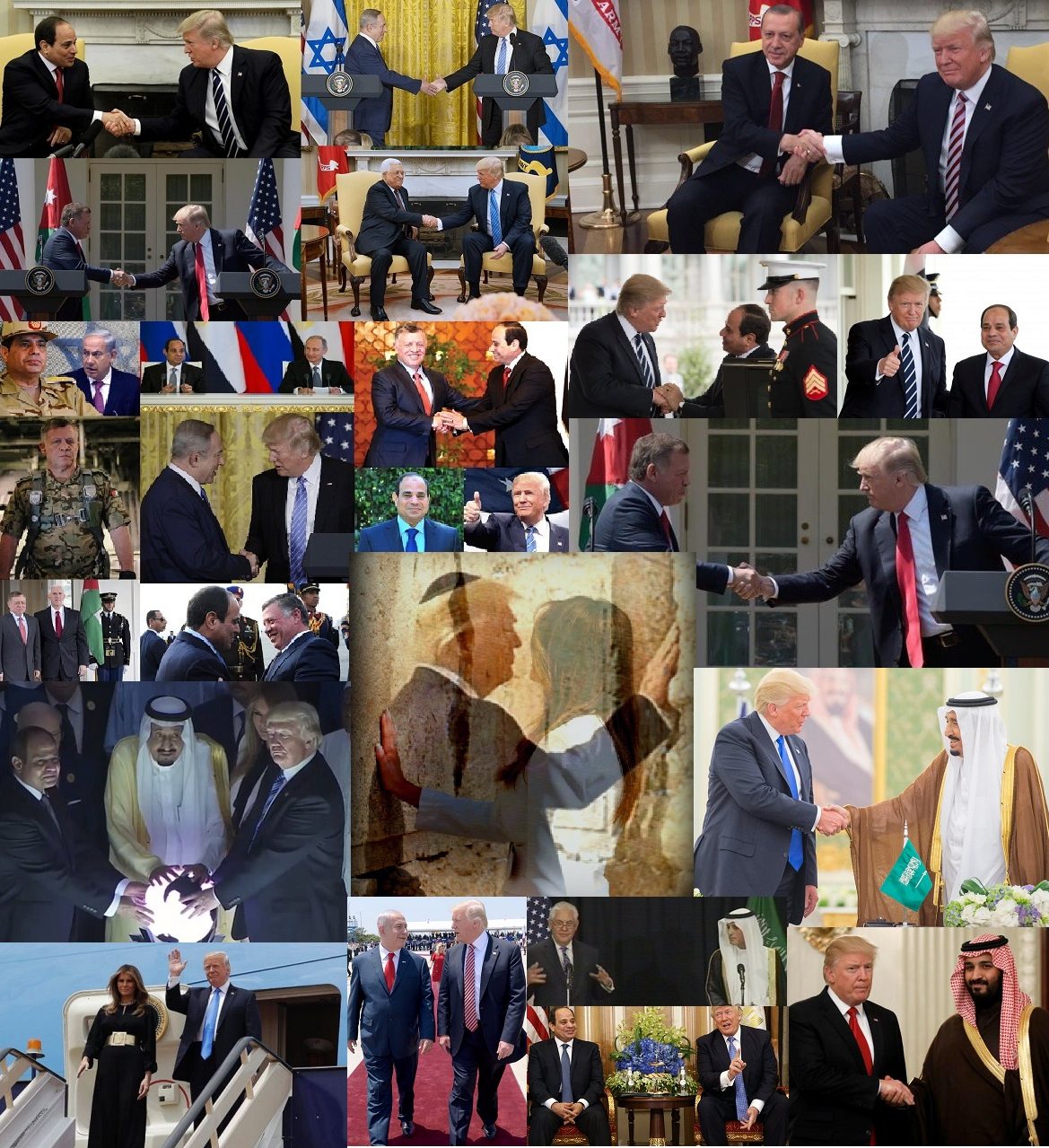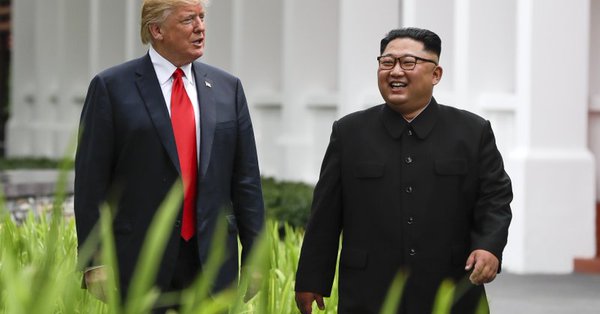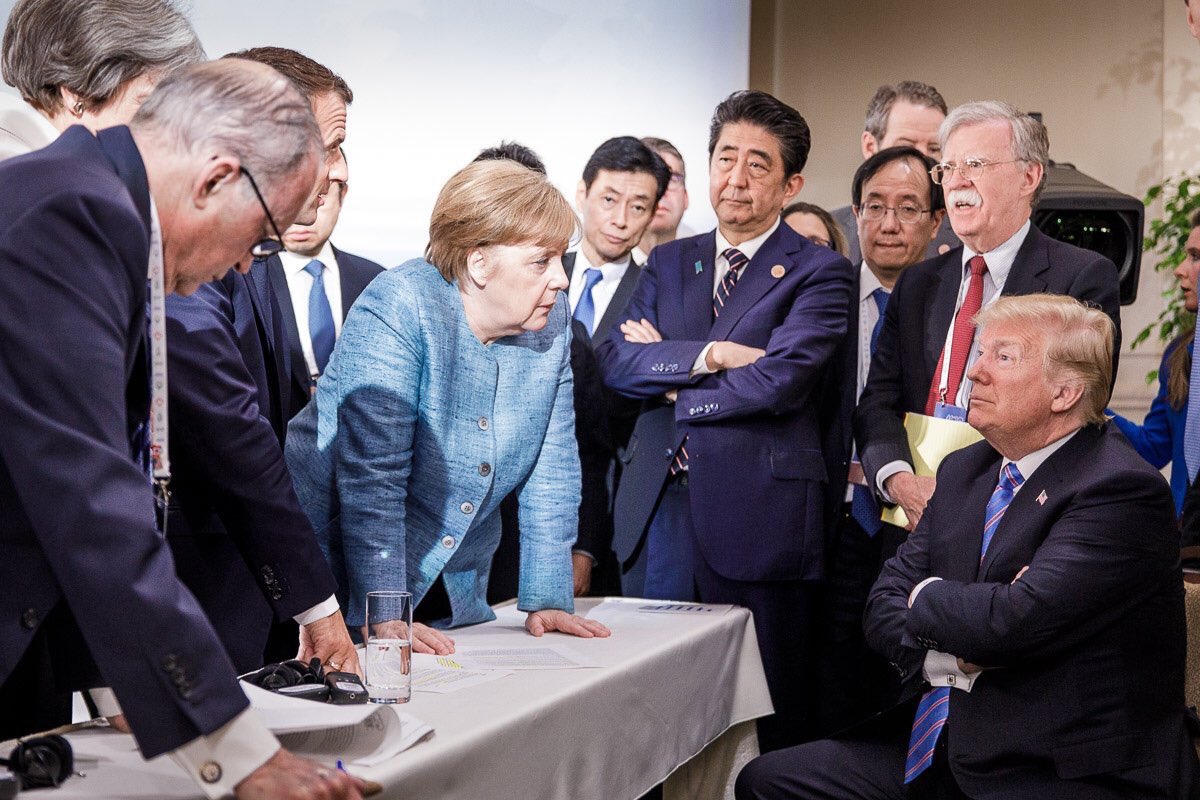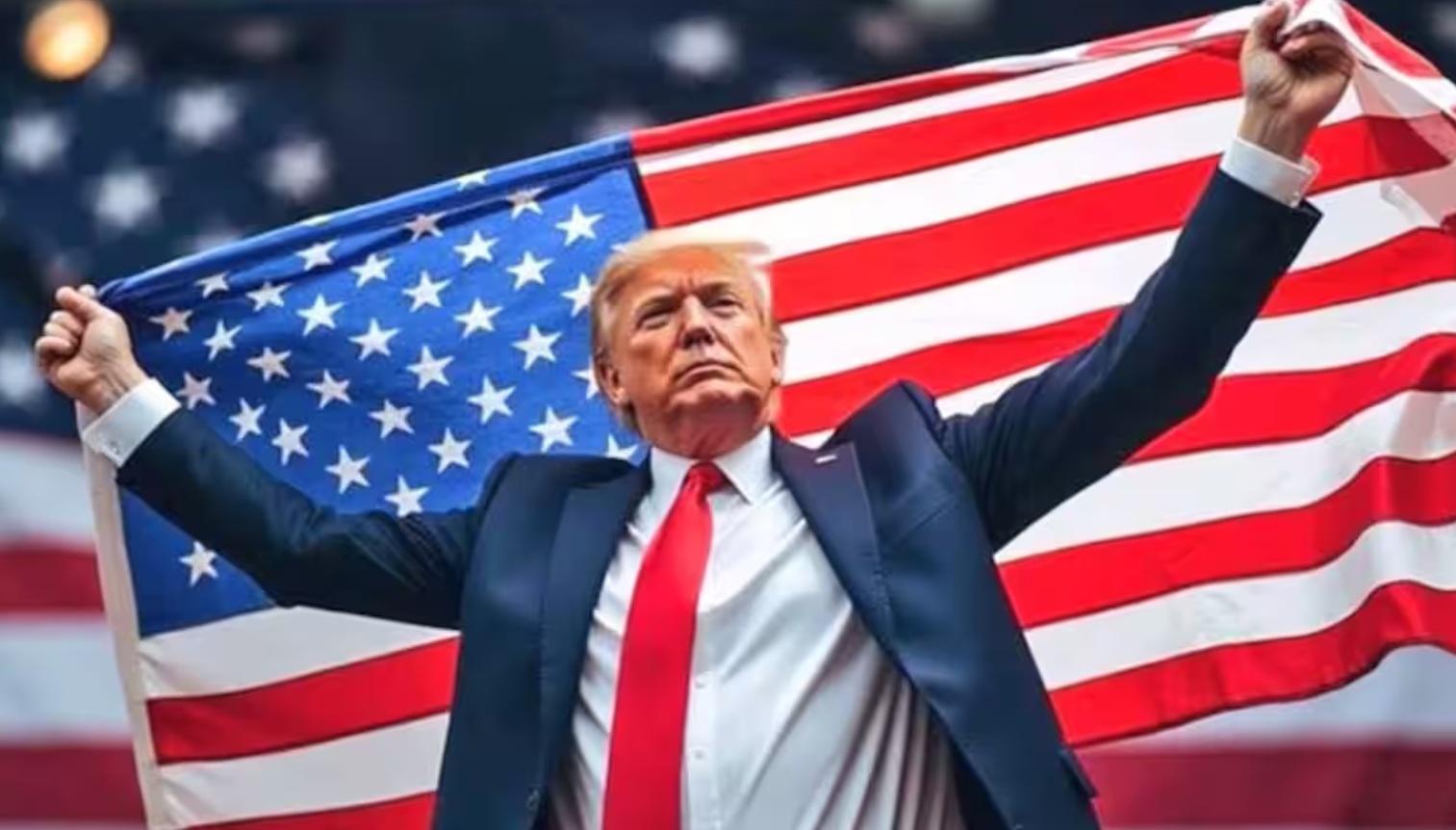The Trump Doctrine
I have written about the Trump Doctrine for several years; however, as we enter this critical inflection moment perhaps a revisit is worthwhile to consider.
What you will notice from President Trump’s responses to questions during foreign leader engagements is the unique nature of his honesty. In the most consequential of ways, President Trump is the most consequential foreign policy leader in generations. We forget that during Trump’s first term in office, the headlines about North and South Korea were not about conflict, but rather about the possibility of unification on the Korean peninsula.
♦President Trump’s foreign policy approach brought North and South Korea together away from the table of conflict. ♦President Trump’s foreign policy approach brought Serbia and Kosovo together away from the table of conflict. ♦President Trump’s foreign policy rallied the Gulf Cooperation Council to stop Qatar’s support for Islamic extremists via the Muslim Brotherhood. ♦President Trump’s foreign policy brought Turkey and the Kurdish forces together away from war and conflict. ♦President Trump’s foreign policy created a ceasefire to stop the bloodshed in Syria. President Trump mediated a cessation of hostilities between India & Pakistan in the Kashmir region. ♦President Trump’s foreign policy brought Israel and the UAE together… and then Bahrain… and then Sudan in the Abraham Accords.
President Trump executes a unique doctrine of sorts, where national security is achieved by leveraging U.S. economic power. It is a fundamental shift in approaching both allies and adversaries; summarized within the oft repeated phrase: “economic security is national security.”
The Trump Doctrine using economics to achieve national security objectives and global peace is a fundamental paradigm shift. Modern U.S. history provides no easy reference for the effective outcome.
President Trump doesn’t just represent an office or title, nor does he simply represent the majority of the American people; President Trump’s voice is the voice of every ordinary person, what the non-English speaking world defines as “simple people,” and he channels a global message from the majority to the top of the highest power structures.
 The nature of the Trump foreign policy doctrine, is to hold manipulative influence agents accountable for regional impact(s); and simultaneously work to stop any corrupted influence from oppressing free expression of national values held by the subservient, dis-empowered, people within the nation being influenced.
The nature of the Trump foreign policy doctrine, is to hold manipulative influence agents accountable for regional impact(s); and simultaneously work to stop any corrupted influence from oppressing free expression of national values held by the subservient, dis-empowered, people within the nation being influenced.
The need for control is a reaction to fear. President Trump is fearless because he doesn’t seek control, he seeks optimal solutions. There are increasing examples of his doctrine at work.
When President Trump first visited the Middle East, he confronted the international audience with a message about dealing with extremist influence agents. President Trump simply said: “drive them out.”
Toward that end, as Qatar was identified as a financier of extremist ideology, President Trump placed the goal of confrontation upon the Gulf Cooperation Council, not the U.S.
The U.S. role was clearly outlined as supporting the confrontation. Saudi Arabia, Kuwait, Egypt, Bahrain and the United Arab Emirates needed to confront the toxic regional influence; the U.S. would support their objective. That’s what happened.
Another example: To confront the extremism creating the turmoil in Afghanistan, President Trump placed the burden of bringing the Taliban to the table of governance upon primary influence agent Pakistan.
Here again, with U.S. support. Pakistan was the leading influence agent over the Taliban in Afghanistan; the Trump administration correctly established the responsibility and gave clear expectations for U.S. support.
If Pakistan doesn’t change their influence objective toward a more constructive alignment with a nationally representative Afghanistan government, it was Pakistan who will be held accountable. Again, the correct and effective appropriation of responsibility upon the influence agent who can initiate the solution, Pakistan.
The process of accurate regional assignment of influence comes with disconcerting sunlight. Often these influences are not discussed openly. However, for President Trump the lack of honesty is only a crutch to continue enabling poor actors. This is a consistent theme throughout all of President Trump’s foreign policy engagements.
Recently President Trump remarked the G7 is only a group of Seven because the Obama-led group took out Russia. How did that benefit the larger goals, it didn’t. President Trump wants to bring Russia back into the group and make it the G8 again.
 Perhaps the most obvious historic application of the Trump Doctrine was found in how the Trump administration previously approached the challenging behavior of North Korea.
Perhaps the most obvious historic application of the Trump Doctrine was found in how the Trump administration previously approached the challenging behavior of North Korea.
Rather than continuing a decades-long policy of ignoring the influence of China, President Trump directly assigned primary responsibility for a DPRK reset to Beijing.
China held, and holds, all influence upon North Korea and has long treated the DPRK as a proxy province to do the bidding of Beijing’s communist old guard.
By directly confronting the influence agent and admitting openly for the world to see (albeit with jaw-dropping tactical sanction diplomacy) President Trump positioned the U.S. to support a peace objective on the entire Korean peninsula and simultaneously forced China to openly display their closely guarded influence.
While the Red Dragon -vs- Panda influence dynamic was quietly playing out in the background, the benefit of this new and strategic approach brought the possibility of peace between the two Koreas’ closer than ever in history.
No longer was it outlandish to think of North Korea joining with the rest of the world in achieving a better quality of life for its people.
Not only was President Trump openly sharing a willingness to engage in a new and dynamic future for North Korea, but his approach is removing the toxic influences that have held down the possibility for generations.
By leveraging China (through economics) to stop manipulating North Korea, President Trump was opening a door of possibilities for the North Korean people. This is what I meant when I said Trump was providing North Korea with an opportunity to create an authentic version of itself.
 What ultimately came from the opportunity President Trump constructed was lost in the 2020 U.S. election outcome. However, the opportunity itself was stunning progress creating a reasonable pathway to prosperity for the North Korean people.
What ultimately came from the opportunity President Trump constructed was lost in the 2020 U.S. election outcome. However, the opportunity itself was stunning progress creating a reasonable pathway to prosperity for the North Korean people.
Chairman Kim Jong-un had the opportunity to be the most trans-formative leader within Asia in generations; but it was always only an ‘opportunity’ that could exist if President Trump remained in place to provide it.
Whether Kim Jong-un could embrace openness, free markets and prosperity was never seen. But we saw the opportunity that was nonexistent without Trump’s guiding hand to create it.
♦The commonality in those foreign policy engagements was the strategic placement of responsibility upon the primary influence agent; and a clear understanding upon those nation(s) of influence, that all forward efforts must ultimately provide positive results for people impacted who lack the ability to create positive influence themselves.
One of the reasons President Trump was able to take this approach was specifically because he was beholden to no outside influence himself.
It is only from the position of complete independence that accurate assignments based on the underlying truth can be made; and that took us to the ultimate confrontations – the trillion-dollar confrontations.
A U.S. foreign policy that provides the opportunity for fully realized national authenticity is a paradigm shift amid a world that had grown accustomed to corrupt globalists, bankers and financial elites who have established a business model by dictating terms to national leaders they control and influence. In Europe they are currently apoplectic at the thought of the unwashed masses becoming ungovernable.
We had/have our own frame of reference with K-Street lobbyists in Washington DC. Much of President Trump’s global trade reset is based on confronting these multinational influence agents. The Wall Street crowd hate him for it.
When you take the influence of corporate/financial brokers out of foreign policy, all of a sudden, those global influence peddlers are worthless. Absent of their ability to provide any benefit, nations no longer purchase these brokered services.
As soon as influence brokers like the World Economic Forum are dispatched, national politicians become more accountable to the voices of their citizens. When representing the voices of citizens becomes the primary political driver of national policy, the authentic image of the nation is allowed to surface.
In western, or what we would call ‘more democratized systems of government‘, the consequence of removing multinational corporate and financial influence peddlers presents two options for the governing authority occupying political office:
♦ One option is to refuse to allow the authentic voice of a nationalist citizenry to rise. Essentially to commit to a retention of the status quo; an elitist view; a globalist perspective. This requires shifting to a more openly authoritarian system of government within both the economic and social spheres. Those who control the reins of power refuse to acquiesce to a changed landscape. This is what Europe is currently doing.
♦The second option is to allow the authentic and organic rise of nationalism. To accept the voices of the middle-class majority; to structure the economic and social landscape in a manner that allows the underlying identity to surface naturally. This is what El Salvador and Argentina are doing.
Fortunately, we are living in a time of great history. National elections like Romania, Georgia, Italy, France and Germany are highlighting responses to dysfunctional multiculturalism and financial influences from corrupt elites within the institutions of globalist advocacy: The International Monetary Fund (IMF), the World Bank, and the World Trade Organization (WTO).
In the U.K. the voices of the British people voted to Brexit from the European Union, as noted by JD Vance during his speech at the Munich Security Conference. However, we see the British government turning more authoritarian and distancing itself from the voices of the majority who chose to rebuke the collective association of the EU. The U.K. government ultimately takes a harsher approach toward suppressing opposition, and as a consequence oppressing free speech and civil liberties. [Insert the example of Tommy Robinson here – there are many others.]
This does not come as a surprise to those who follow the arc of history when the collective global elite are challenged or rejected. Globalism can only thrive amid a class structure where the elites, though few in number, have more controlling power over the direction of government.
It is not accidental the EU has appointed officials and unelected bureaucrats in Brussels as the primary decision-making authority. By its very nature the EU collective requires a central planning authority who can act independent of the underlying national voices.
 As the Trump Doctrine clashes with European global elite, the withdrawal of the U.S. financial underwriting creates a natural problem.
As the Trump Doctrine clashes with European global elite, the withdrawal of the U.S. financial underwriting creates a natural problem.
Trump plays the economic card because in fact, subsidies are needed to retain domineering government. If the national citizenry has to pay directly for the indulgent decisions of the influence class, a crisis is only a matter of time. This is the “fear” component within the need for control by the European elite.
Wealth distribution requires a host.
Since the end of World War II, the U.S. had been a bottomless treasury for EU subsidy. The payments have been direct and indirect.
The indirect payments have included U.S. military bases providing security, the NATO alliance, and also U.S. trade policy permitting one-way tariff systems.
All forms of indirect subsidy are now being reversed as part of the modern Trump Doctrine.
Brussels, led by the EU’s largest economy, Germany, is having fits!






Post a Comment